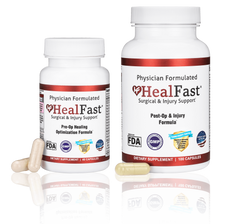

Is Fasting Before Surgery Necessary?

If you’ve ever been scheduled for a medical procedure, whether it’s a major operation or a routine procedure like a colonoscopy, you’ve probably heard the instructions: “No eating or drinking after midnight.” This requirement is known as preoperative fasting, and many patients wonder why it’s so important. How long do you have to fast before surgery? Can you drink water while fasting before surgery? And are there exceptions?
This guide breaks down everything you need to know about fasting before surgery, and why it matters.

Why Do You Have to Fast Before Surgery?
During surgery, especially when anesthesia is involved, your body doesn’t function the same way it normally does. General anesthesia temporarily paralyzes your muscles, including those that help keep food and liquid safely in your stomach.
If your stomach isn’t empty and you vomit while sedated, the stomach contents can enter your lungs. This condition is called aspiration, and it can be very dangerous, causing breathing difficulties, lung infections, aspiration pneumonia, and prolonged hospitalization. Fasting keeps your stomach empty, drastically reducing the risk of aspiration (1).
But that isn’t the only reason. Fasting also helps:
-
Stabilize blood sugar levels during surgery
-
Prevent nausea and vomiting after anesthesia
-
Ensure smoother recovery and complication-free outcomes
In short, fasting isn’t just a medical tradition; it’s a scientifically proven safety measure.
Fasting Rules for Different Types of Anesthesia
There are several types of anesthesia used in surgery, and fasting requirements depend on the level of sedation and airway involvement:
|
Type of Anesthesia |
Common Procedures |
Fasting Requirement |
|
General Anesthesia |
Major surgeries (tummy tuck, BBL, breast augmentation, rhinoplasty) |
Strict fasting is required - no solid food for more than 6 to 8 hours; clear liquids allowed up to 2 hours before (unless told otherwise) |
|
Regional Anesthesia (spinal or epidural) |
Orthopedic surgery, childbirth |
Usually same fasting rules as general anesthesia are followed, because sedatives are often used, and there is a risk of having to undergo general anesthesia. |
|
IV Sedation / MAC (Twilight anesthesia) |
Cosmetic procedures like eyelid surgery, smaller liposuction areas |
Fasting is usually the same as general, since you are not fully conscious, and your reflexes are reduced |
|
Local Anesthesia |
Minor skin procedures, mole removal, scar revision |
Minimal or no fasting required unless sedation is added |
Even if you are not fully asleep, sedation can affect protective airway reflexes - so fasting rules remain strict for most cosmetic procedures.
Your surgeon or anesthesiologist will give you the safest and most accurate instructions based on your specific surgery.
Can You Drink Water While Fasting Before Surgery?
Fasting instructions aren’t the same for everyone - they can vary based on a person’s age, type of procedure, and the kind of anesthesia being used. Infants, children, and adults all process foods and liquids differently, so medical teams tailor guidelines to keep each patient safe.
Adults:
For most healthy adults who are preparing for an elective procedure with anesthesia, clear liquids, including plain water, are usually allowed up to about 2 hours before anesthesia. Clear liquids also include beverages like oral electrolyte drinks, pulp-free juices, black coffee, or tea without milk. These fluids empty from the stomach quickly, helping keep you hydrated and more comfortable before surgery.
Infants:
Fasting instructions for infants depend on what they are being fed. Breast milk can typically be given up to 4 hours before surgery, while infant formula takes longer to digest and is usually stopped 6 hours before anesthesia. These guidelines help reduce the risk of stomach contents entering the airway during anesthesia.
Children:
Children may generally follow a schedule similar to adults when it comes to clear liquids, meaning they can drink water or other approved clear fluids up to 2 hours before anesthesia. However, solid foods, milk, or dairy products need to be stopped much earlier, usually 6–8 hours before surgery, to ensure their stomach is empty for a safe procedure.
Hydration benefits your body before surgery by:
-
Supporting healthy blood pressure
-
Preventing dehydration-related headaches and dizziness
-
Making IV insertion easier
-
Reducing constipation after surgery
Check Out: Role of Hydration in Accelerating Surgical Recovery Times
Should You Take Medications While Fasting Before Surgery?
Most patients are still allowed, and often required, to take their regular medications on the day of surgery, even while fasting. Typically, these can be taken at your usual time with just a small sip of water so the stomach remains mostly empty.
However, there are important exceptions. Certain medications may need to be paused before surgery, depending on how they affect bleeding, heart function, blood sugar, or anesthesia.
Note: Even though fasting is required right before surgery, nutrition remains critically important in the days leading up to your procedure. A well-nourished body heals faster, maintains stronger immunity, and supports better outcomes overall.
That’s where HealFast shines. Our doctor-formulated pre-surgery recovery supplements are designed to help you build up essential nutrients before surgery. They make it easier to stay nutritionally supported while following pre-surgery fasting rules.
Always follow your surgeon’s guidance and confirm any supplements as part of your surgical plan.
Related Articles -
Why Do Surgical Scars Feel Lumpy? Is It Normal?
Why You Shouldn’t Skip Post-Op Follow-up Appointment (Even If You Feel Fine)
Collagen vs. Collagen Peptides: Which Is Best for Scar Healing?
What You Should Do If you accidentally eat or drink something?
If you accidentally eat or drink something before surgery, don’t panic, but notify your nurse, anesthesiologist, or surgeon immediately. Your medical team will assess the situation based on several factors, including what you consumed, the quantity consumed, the time elapsed since consumption, your overall health, and the type of anesthesia planned.
Depending on their evaluation, they may still proceed with the surgery, delay it for a few hours, or reschedule it for another day to ensure your safety. Your honesty is crucial - hiding this information could put you at serious risk during anesthesia.
Reference:
1. Kraft, B. (2017, June 16). Why Patients Must Fast Before Surgery. Joint Base Elmendorf-Richardson. https://www.jber.jb.mil/News/Articles/Display/Article/1306671/why-patients-must-fast-before-surgery/

- One of the most followed doctors online with 3.5+ million followers and 1 billion+ views in 2024 (Instagram, YouTube, TikTok, and Facebook)
- Board Certified Anesthesiologist and Clinical Assistant Professor who frequently teaches medical students, residents, and other physicians in medical school and hospital settings.
- Speaker and medical researcher having published 1 book, 3 book chapters, and over 57 scientific articles. Made over 100 presentations at national and international medical conferences on topics ranging from healthcare innovation, to nutrition, to patient safety.
- Serial entrepreneur having launched several healthcare companies with a track record of innovation within healthcare systems

Myro Figura, M.D.
- One of the most followed doctors online with 3.5+ million followers and 1 billion+ views in 2024 (Instagram, YouTube, TikTok, and Facebook)
- Board Certified Anesthesiologist and Clinical Assistant Professor who frequently teaches medical students, residents, and other physicians in medical school and hospital settings.
- Speaker and medical researcher having published 1 book, 3 book chapters, and over 57 scientific articles. Made over 100 presentations at national and international medical conferences on topics ranging from healthcare innovation, to nutrition, to patient safety.
- Serial entrepreneur having launched several healthcare companies with a track record of innovation within healthcare systems
HealFast Complete Nutrition for Surgery & Injury Recovery - Everest Only
OPTIMIZE RECOVERY & SUPPORT HEALING from surgery, injury, and extreme sports with the most comprehensive...
$49.99
Shop NowHealFast Nutrition for Pre-Surgery and Injury - Everest Only
OPTIMIZE RECOVERY & SUPPORT HEALING from surgery, injury, and extreme sports with the most comprehensive...
$15.99
Shop Now












